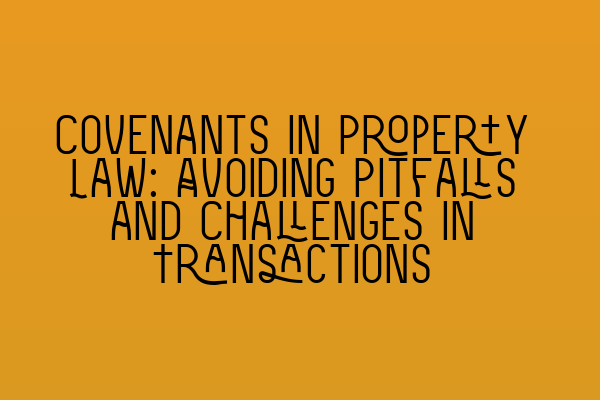Covenants in Property Law: Avoiding Pitfalls and Challenges in Transactions
In property law, covenants play a crucial role in governing the use and enjoyment of land. Whether you are purchasing a property, leasing it, or seeking to develop it, understanding covenants is essential to ensure a smooth transaction. However, covenants can often be complex and full of legal nuances, leading to pitfalls and challenges if not handled properly. In this article, we will explore the key concepts of covenants in property law and provide practical tips to navigate these challenges successfully.
1. What are Covenants?
Covenants are legal obligations or promises related to the use or behavior of land that is binding upon the current owner as well as any subsequent owners. They are typically included in land titles, leases, or deeds to ensure that certain restrictions or requirements are followed. Covenants can cover various aspects, such as restrictions on land use, maintenance obligations, or prohibitions on specific activities.
2. Types of Covenants
There are two main types of covenants: positive and negative covenants. Positive covenants require the landowner to actively do something, such as maintaining certain standards of upkeep or contributing to the maintenance of shared facilities. Negative covenants, on the other hand, prohibit specific actions or impose restrictions on the use of the land.
For example, a positive covenant may require a property owner to contribute to the upkeep of a communal garden, while a negative covenant may prohibit the construction of additional structures on the property. It is essential to identify the type of covenant involved in a particular property transaction to understand its implications fully.
3. Enforceability of Covenants
Covenants can be enforceable either by individuals or by local authorities, depending on their nature and terms. The enforceability of covenants is usually determined by their incorporation into binding legal documents, such as deeds or leases. It is important to review the specifics of each covenant to determine who has the authority to enforce them.
When purchasing a property, it is crucial to conduct a thorough due diligence process to identify all covenants associated with the property. This can be done by reviewing title deeds, land registry information, or seeking legal advice from a property solicitor. Failure to identify and understand applicable covenants can result in costly complications or legal disputes down the line.
4. Breaching Covenants
Breaching a covenant can have severe consequences, including legal action and financial liabilities. Therefore, it is vital to be aware of the obligations and restrictions specified in the covenants related to a property.
If you are planning to develop a property or make any modifications, it is essential to ensure that you comply with any existing covenants. Failure to do so can result in injunctions, forfeitures, or damages claims from affected parties. Seeking legal advice and obtaining necessary approvals or consents before commencing any development work is highly recommended.
5. Overcoming Challenges
Navigating covenants can be challenging, particularly if you encounter conflicting obligations or unclear language. In such situations, it is advisable to consult a property solicitor to obtain professional advice.
Additionally, engaging a solicitor with expertise in property law and covenants can help you negotiate or seek variations to covenants as part of your property transaction. Understanding the legal possibilities and limitations can enhance your ability to achieve your desired outcomes without breaching existing obligations.
6. Conclusion
Covenants are a vital aspect of property law, governing the rights and responsibilities of landowners. By understanding the types of covenants, their enforceability, and the potential pitfalls associated with breaches, you can safeguard your interests and avoid future complications.
To further enhance your understanding of property law and prepare for your legal exams, consider exploring our related articles:
– SQE 1 Practice Exam Questions: Test your knowledge with our collection of practice questions.
– SQE 1 Practice Mocks FLK1 FLK2: Experience the exam-like environment with our practice mocks.
– SQE 2 Preparation Courses: Prepare for SQE 2 with our comprehensive courses.
– SQE 1 Preparation Courses: Get ready for SQE 1 with our specialized courses.
– SRA SQE Exam Dates: Stay updated on the latest exam dates for the SRA SQE.
At SQE Property Law & Land Law, our team of solicitors is well-versed in all aspects of property law, including covenants. Contact us today to receive expert guidance and ensure a successful property transaction.
Remember, understanding covenants is the key to avoiding pitfalls and challenges in property transactions. Stay informed, seek professional advice, and protect your interests for a smooth and secure property journey.
